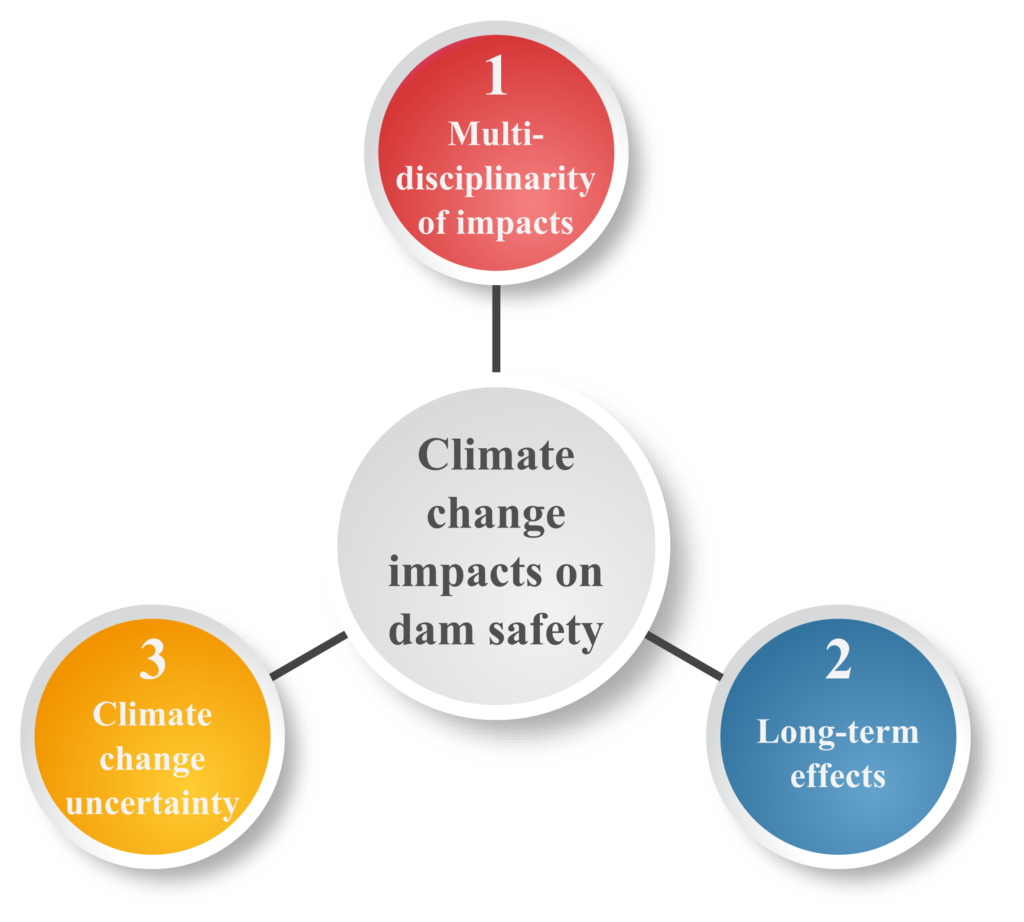Large dams as well as protective dikes and levees are critical infrastructures whose failure has major economic and social consequences. Risk assessment approaches and decision-making strategies have traditionally assumed the stationarity of climatic conditions, including the persistence of historical patterns of natural variability and the likelihood of extreme events.

However, climate change has a major impact on the world’s water systems and is endangering dam safety, leading to potentially damaging impacts in terms of economic, social and environmental costs. Changes in climate factors such as variations in extreme temperatures or frequency of heavy precipitation events are likely to affect the different factors driving dam failure risks. Owners and operators of dams must adapt their mid- and long-term management and adaptation strategies to new climate scenarios.
The need to update such strategies faces 3 main challenges:
- Multidisciplinarity of impacts
The effects of climate change are expected on a variety of factors affecting dam safety, from the incoming floods to the definition of downstream consequences. They are conditioned by climatic but also by non-climatic drivers such as population increase, economic development, or water management adaptation.
- Long-term effects
Different factors make risks susceptible to evolve with time (e.g., changes in climate or increasing exposure of people and economic assets in at-risk areas as a result of population and economic growth). Moreover, the efficiency of adaptation measures may also change over time. Decision-making processes should be updated to consider risks and costs as time series rather than fixed values.
- Climate change uncertainty
Inherent climate-related uncertainties affect the efficiency of risk analyses and hence the decisions based on their results. Dam failure risks can be subjected to climate change uncertainties in different ways. Besides natural uncertainty, the socio-economic dimension of climate change impacts must also be considered. The incorporation of these uncertainties into the process of dam safety governance is of paramount importance for a resilient and efficient adaptation strategy.

In my thesis, I propose a comprehensive approach to incorporate climate change impacts on dam safety management and decision-making support. The goal is to design adaptation strategies that incorporate the non-stationarity of future risks as well as the uncertainties associated with new climate scenarios.
Based on an interdisciplinary review of the state-of-the-art research on its potential effects, the global impact of climate change on dam safety is structured using risk models. This allows a time-dependent approach to be established to consider the potential evolution of risk with time. Consequently, a new indicator is defined to support the quantitative assessment of the long-term efficiency of risk reduction measures. Additionally, in order to integrate the uncertainty of future scenarios, the approach is enhanced with a robust decision-making strategy that helps to establish the consensus sequence of measures to be implemented for climate change adaptation. Despite the difficulties to allocate probabilities to specific events, such framework allows a systematic and objective analysis, reducing considerably the subjectivity.
Such a methodology is applied to a real case study of a Spanish dam subjected to the effects of climate change. The analysis focus on hydrological scenarios, where floods are the main load to which the dam is subjected. The results provide valuable new information with respect to the previously existing analysis of the dam regarding the evolution of future risks and how to cope with it. In general, risks are expected to increase with time and, as a result, new adaptation measures that are not justifiable for the present situation are recommended. This is the first documented application of a comprehensive analysis of climate change impacts on dam failure risk and serves as a reference benchmark for the definition of long-term adaptation strategies and the evaluation of their efficiency.


